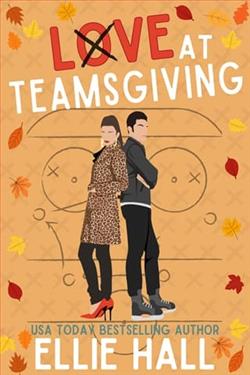Page 50 of Saltwater
But as I flip over the final page ofSaltwater,there’s something about it that feels uncanny. Familiar. Like my own body, my own reflection, only viewed from a different angle. And I think it’s familiar because it feels likethem.Like my family.
I tell myself my mother was an artist, that she adapted what she knew. The same way I do in front of a canvas. But enough of the details are accurate to sound an alarm. The way one of the characters never tips more than ten dollars, no matter the total bill, just like my father. Or the way another gives lavish, nearly unusable gifts to everyone from the housekeeper to the barber every holiday, like Naomi. Because if there’s truth to what she’s written—and I’m not ready to believe that’s what it is,true—then I have to face the reality that I might have been wrong all these years. That they might have killedher. That, at the very least, they hadareasonto. And that finding this play might have given them a reason to do the same to Lorna, too.
—
Lorna was supposed toleave for Naples from the Marina Grande, so the next morning I go there. I want to take a closer look at the docks, ask to see any surveillance footage from businesses that might have been open that night. A trip to the Marina Grande will also bring me past the one police station on the island.
Of course, I know there’s a chance she never made it that far. That she and the bag full of our money might have gone off course long before the marina. Capri’s central town a warren of side streets and dead ends that rival Venice.
I plan to take a taxi, but when I pass the crowd waiting for the funicular, I see a thick sheet of brown hair and two long, bare legs through the tangle of vacation sandals and shorts. It’s not her; it can’t be. I stop anyway and try to get a better look.
The crowd moves. Bodies shuffle from outside the funicular into the top terminal. And as they do, I get another glimpse—a tan face, a distinctive nose, the fall of her hair. A shock of recognition courses through me.Lorna.The group is nearly through the doors, and I slip in with them.
Person after person ahead of me passes through the turnstile, scanning their ticket. But I don’t have time to buy one. Below us, the funicular is approaching, its front windows a sea of faces who boarded minutes ago at the Marina Grande. There are phones recording the funicular’s progress, a conductor sitting on a stool. I grab a used ticket from the floor, and when it’s my turn, I attempt to feed it through the machine. It blinks red. I try again, knowing it won’t work.
The shimmer of brown hair moves as Lorna turns and looks behind her.I have to get to her.
That’s all I can think when the clerk comes over and takes the ticket. He shakes his head:It’s no good.Behind me, murmurs of annoyance filter up, and I step out of line. The funicular has reached the top terminal and stopped. I say to the man in English that I don’tunderstand, I just bought the ticket. And even though he looks like he’s about to turn me away, he shrugs, manually opens the gate.
I’m stuck at the back of the platform now. But I keep my eyes on her. Even if we won’t be in the same funicular car, I’ll have a chance to catch her at the bottom. To ask her where she’s been, what happened. To ask why she hid the play, the pregnancy test. To ask why she’s running. The doors to the funicular open with a pneumatic flush, and I wait until the car is nearly full before squeezing myself inside.
The interior is old and scratched. Charming, but well used. During the slow season, I imagine, it would be easy to sit, but all the seats are occupied. Parents hold children up so they can have a better view. We lurch into motion, and passengers hit record on their phones. Through the glaze of the windows, I can see her two cars ahead—her narrow shoulders, the length of her neck.
“What if they think I stole the money?” Lorna had asked back in Los Angeles. “Don’t you think they’ll suspect I never delivered it? That I just took it?”
They would, of course. They would pull her phone records and go through her computer. They would review her background check and comb through past work references. But they’d be afraid, too. Afraid that it was real. Afraid of the suspicion that haunted our lives. Afraid that if they went to the police, they wouldn’t be believed.
Even as a child, I knew what people said about us. They whispered about my father, about my mother; they made it clear that if something bad happened, it was because my family deserved it.Or did it.At six years old, I had learned to mumbleNo comment.As a teenager, I could repeat the same rote talking points:He didn’t do it. It’s just a tragedy.And more to the point:Leave me alone.
But if I ever leaned into the kindness of a stranger, if I ever saidplease,they took it as an opening. No. They took it as a trapdoor. As if they were on the precipice of discovering the long-hidden Lingate secret. But my family kept their secrets even from me. I had nothing to tell.
We approach the lower terminal. The views gone. The tracks dipping between apartment blocks and walls covered with thick,creeping vines. The children have been placed back on the floor by their parents, and I am pressed up against the glass.
When the doors finally open, I am the first one out. I take the stairs of the platform as quickly as I can. I weave through the sea of tourists until I catch her. My hand reaches for her shoulder, and I know it’s her. That like me, she’s scared. Hiding.
“Lorna?” Her name comes out almost like a sigh.
But when she turns, her lips are too full and her eyes are too close together. It’s like seeing in the mirror a reflection that doesn’t belong to you. The moment nearly incomprehensible, terrifying.
“Mi dispiace,”I say.
I’m sorry. I thought you were someone else.
The passengers from the funicular jostle me, shoulder past. A child looks up at me with pity. I let the bodies flow around me until I’m alone, the platform empty. It feels final. More final than her absence at breakfast yesterday. Whatever happened, Lorna is gone.
“Helen?”
Stan’s voice echoes off the high ceiling of the funicular platform. I turn around and see him several steps above me. He closes the distance between us and I smile. I always smile in moments like this. It’s so easy to plaster it on. My mother’s death, if nothing else, gave me that skill.
“What are you doing here?” I ask him.
Stan doesn’t take the funicular.
“I saw you waiting at the top.” He looks around. “Is she here?”
There’s no preamble, no small talk. He’s fidgety—he crosses his arms, flicks at something on his sleeve, then shoves his hands into his pockets. Stan hasn’t had to walk past rows of photographers who, day after day, are hoping for a reaction.
Is she here?















